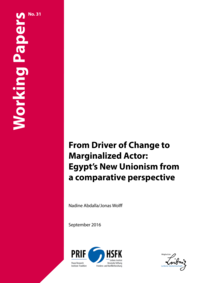Nadine Abdalla, Jonas Wolff
From Driver of Change to Marginalized Actor: Egypt’s New Unionism from a Comparative Perspective
Abstract
The paper analyzes why Egypt’s labor movement, while having played a significant role in the runup to the 2011 revolution, has been increasingly marginalized politically ever since, failing to achieve either significant labor-specific gains and/or broader objectives related to the overall process of political transformation. It does so by investigating Egypt’s movement of independent trade unions, the most dynamic element within the country’s labor movement, from a comparative perspective. Specifically, the paper uses the experience of Brazil’s New Unionism in the 1980s as a contrasting case, identifies the factors that have enabled and constrained what is arguably the most successful example of a New Unionist movement in the Global South, and applies this explanatory framework in an in-depth study on the trajectory of Egypt’s New Unionism since 2011.
A revised version of this working paper has been published with the Journal of North African Studies: Abdalla, Nadine/Wolff, Jonas (2019): From driver of change to marginalised actor: Organised labour in post-revolutionary Egypt from a comparative perspective, in: Journal of North African Studies, published online 7 Oct 2019, https://doi.org/10.1080/13629387.2019.1644917.
Bibliographic record
Abdalla, Nadine / Wolff, Jonas (2016): From Driver of Change to Marginalized Actor: Egypt’s New Unionism from a Comparative Perspective, PRIF Working Papers No. 31, Frankfurt/M.

- Name
- PRIF_WP_31.pdf
- Extension
- Size
- 207,80 KB